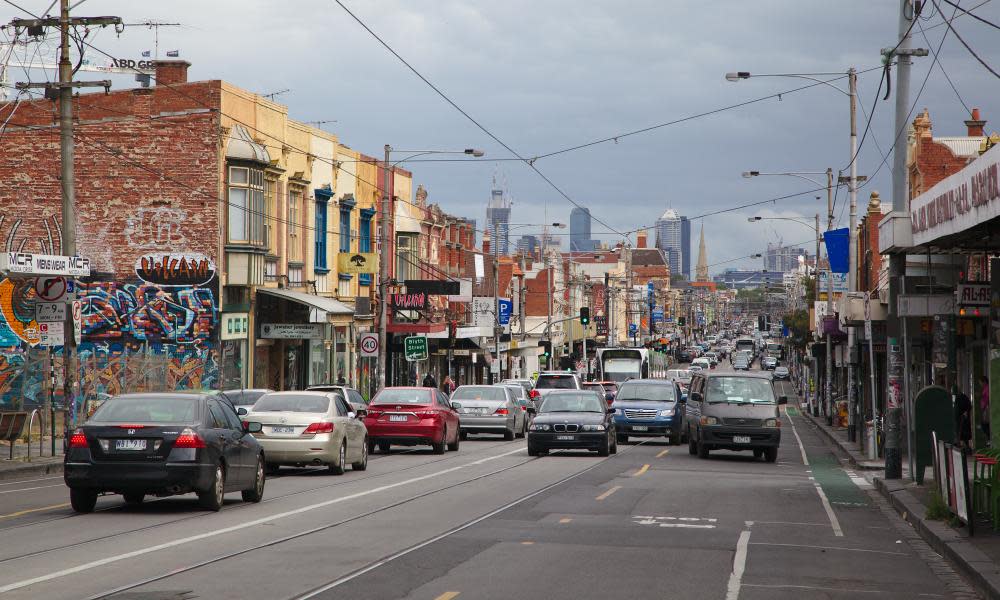‘Wellness warriors’: how Victoria’s vaccine mandate sparked divisions in progressive Brunswick

Explanations for why Brunswick’s second-dose rate is 10% or more behind the state average vary – from the younger demographic to the alternative health crowd
At the start of Sydney Road in the Melbourne suburb of Brunswick is a popular yoga studio. Its promise is humble: “Provide opportunities for the community to positively change their experience of life.”
On its Facebook page, in between posts about Krishna and breath-work, the studio is offering those who lost their job because of the vaccine mandate a chance to participate in a free yoga course, valued at $2,700.
“We are happy to show you that there will always be great gifts for those that stand up for what you believe in and choose to walk the path of integrity,” the post reads.
Related: How do you argue with anti-vaxxers who believe they’re on a noble mission? | Myke Bartlett
The studio’s founder, Aimee, posts publicly on her own personal page about Victoria’s pandemic bill, mainstream media and the mandate.
Her cover photo on that page is two people holding guns, wearing T-shirts that say: “F**k That Vaccine.” Neither the studio nor Aimee engaged with the Guardian’s requests for an interview. A message received by the Guardian from the studio, purportedly from Aimee, said “we are not anti-vax”.
A short walk up Sydney Road, which runs through the guts of the alternative suburb, Harry has just opened Green Phoenix cafe.
Since lockdown lifted he has struggled with foot traffic and thinks it is because of a combination of higher cases and the mandate.
“The double-vax mandate just restricted people from coming in,” he said. “Especially here in Brunswick. There are a lot of anti-vaxxers. They are very health-conscious, you know, vegan.
“We have some regulars that couldn’t come in because of this.”
According to state data, Brunswick – along with a number of neighbouring affluent suburbs such as Carlton and Fitzroy – is lagging behind the average for vaccine uptake.
Brunswick only hit the 70% second dose mark on 4 November, and is currently sitting somewhere between 75% and 80%. The state average is now over 90%.
But the explanations of why Brunswick’s rate is lower are varied. The dominant theory is that, like City of Melbourne, Brunswick’s population data is skewed because it was compiled pre-pandemic and a lot of expats and international students have since left.
Others include a lower take-up because of the younger demographic, or a higher migrant population that struggled to get access to the vaccine.
Some suggest it’s the alternative health crowd.
Dr Jessica Kaufman, a research fellow in the Vaccine Uptake Group at the Murdoch Children’s Research Institute, says without the data it is impossible to say, but the three main drivers of hesitancy are distrust, individualism and valuing purity.
“When you think about those three main pillars, the wellness industry side hits all of them,” Kaufman says.
While she stresses a lot of affluent inner-city communities embrace alternative medicine, she says Brunswick has historically lower rates of childhood vaccination.
“It’s possible there is a concentration of [these] views,” she says.
Kaufman says there is an industrial complex around the wellness anti-vaxx movement that sees companies profit from selling rich people on the idea that “if you eat enough kale you’ll be healthy”.
“A large portion of the small number of people still not vaccinated are resistant to it in the face of the mandate and they’ll get louder as they are pushed into the corner; businesses will hear about it because they’re being forced to ask,” she says.
Some locals back up that idea, saying they’re dealing with more anti-vaxxers.
Email: sign up for our daily morning briefing newsletter
App: download the free app and never miss the biggest stories, or get our weekend edition for a curated selection of the week's best stories
Social: follow us on YouTube, Facebook, Instagram, Twitter or TikTok
Podcast: listen to our daily episodes on Apple Podcasts, Spotify or search "Full Story" in your favourite app
Tim Cohen runs a wine bar in Brunswick East, which is home to organic supermarkets, craft beer bars and hip restaurants.
He’s just reopened his bar and says he and his staff have “copped abuse” from anti-vaxxers who come in expecting to be served.
“Last Friday a young woman came in … She got quite aggressive … She demanded to play the victim, she wanted to be oppressed.”
Cohen describes the “wellness warrior” subculture in the area as privileged, young and morally righteous.
“It’s a politically motivated suburb,” he says. “It’s … very opinionated.”
And it’s not just the adults.
Pedro sends his daughter to a primary school in Coburg, just north of Brunswick. He says she’s coming home and telling him a lot of her friends come from “anti-vax families”, and that they told her Covid vaccines would cause heart disease.
“They were also telling my daughter that being vaccinated will prevent her from having children,” he says.
It is impossible to say how many people hold strong anti-vax beliefs, or why. The data just doesn’t exist.
And a lot of Brunswick residents are quick to stress these people are in the minority.
Associate Prof Katie Attwell, a vaccination social scientist and policy expert from the University of Western Australia, says these groups are moving to live in suburbs they feel reflect some of their values.
They might think of themselves as progressive, care about the environment, eat organic and have hobbies and beliefs that overlap with wellness communities, she says.
“These are people who are pro-environment, pro-science when it works for them … It’s people who may have voted for left-leaning parties, who would imagine themselves as progressive in many aspects of their lives,” Attwell says.
But the increasingly divisive conversations around these issues and the state’s vaccine mandate has pushed many to the right of the political spectrum, she says.
“It is bringing out their anti-authoritarian streak.”


